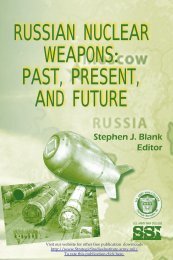The United States and China in Power Transition - Strategic Studies ...
The United States and China in Power Transition - Strategic Studies ...
The United States and China in Power Transition - Strategic Studies ...
Create successful ePaper yourself
Turn your PDF publications into a flip-book with our unique Google optimized e-Paper software.
system modernization (although the CCP had made<br />
some reluctant political changes to accommodate<br />
economic development <strong>in</strong> the last 30 years). Sound<br />
familiar? It is like Yangwu all over aga<strong>in</strong>. Thus for all<br />
the years s<strong>in</strong>ce 1860 when the Yangwu started, <strong>Ch<strong>in</strong>a</strong>’s<br />
modernization has been march<strong>in</strong>g <strong>in</strong> place (原地踏步).<br />
Genu<strong>in</strong>e progress is yet to come.<br />
<strong>The</strong> current economic reform, however, is much<br />
more difficult than the Yangwu movement 150 years<br />
ago. Unlike their Yangwu predecessors, the PRC reformers<br />
carried a heavy ideological burden—every<br />
reform measure must be set to improve, but not to underm<strong>in</strong>e<br />
socialism <strong>and</strong> the CCP’s rule of <strong>Ch<strong>in</strong>a</strong>. This<br />
was almost a mission impossible, for the def<strong>in</strong><strong>in</strong>g character<br />
of <strong>Ch<strong>in</strong>a</strong>’s open<strong>in</strong>g <strong>and</strong> economic reform was to<br />
attract foreign capital, technology, <strong>and</strong> management<br />
skills <strong>and</strong> to turn the dysfunctional comm<strong>and</strong> economy<br />
(the ma<strong>in</strong>stay of socialism) <strong>in</strong>to capitalist market<br />
economic operations. <strong>The</strong> CCP leaders knew it well<br />
from their ideological prescriptions (i.e., Marxism)<br />
that there is a law-like relationship between the economic<br />
foundation (经济基础) <strong>and</strong> its correspond<strong>in</strong>g<br />
political superstructure (上层建筑), i.e., democracy is<br />
associated with market economy, <strong>and</strong> communism<br />
is def<strong>in</strong>ed by comm<strong>and</strong> economy, respectively. How<br />
could the CCP carry out the economic reform but still<br />
preserve socialism <strong>and</strong> its legitimate rule of <strong>Ch<strong>in</strong>a</strong>?<br />
<strong>The</strong> answer was a tricky one. Early <strong>in</strong> the reform<br />
drives, the CCP passed a Party resolution to designate<br />
<strong>Ch<strong>in</strong>a</strong> as a “socialist state at its early stage (初级阶段社<br />
会主义)” <strong>and</strong> promised to use whatever means to turn<br />
it <strong>in</strong>to a prosperous socialism. This resolution may<br />
sound simple, but it had many implications. First,<br />
it made <strong>Ch<strong>in</strong>a</strong>’s economic backwardness <strong>and</strong> other<br />
shortcom<strong>in</strong>gs excusable. Second, the promise to im-<br />
48

















